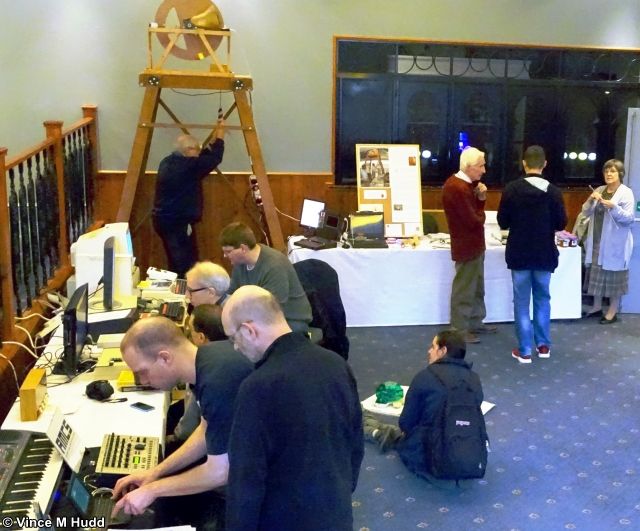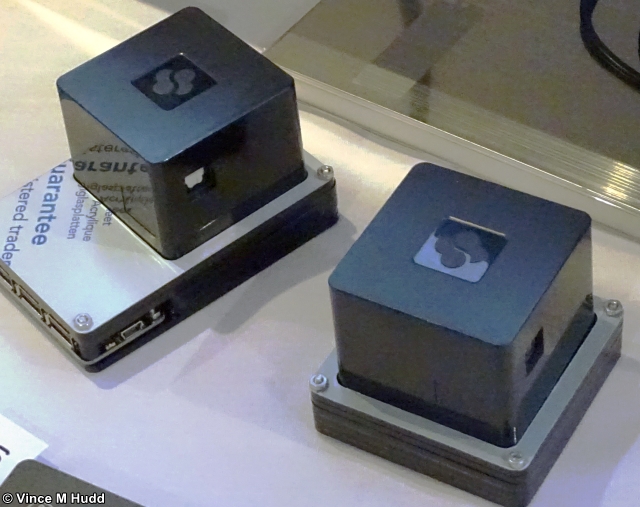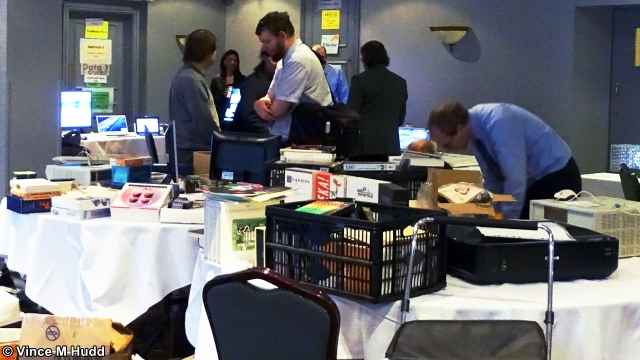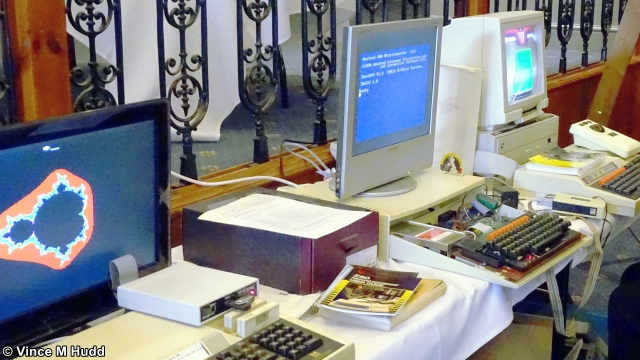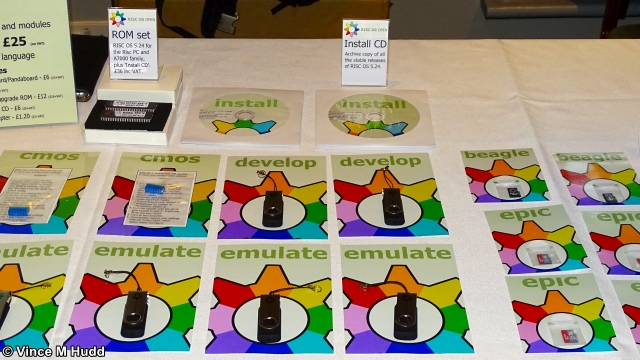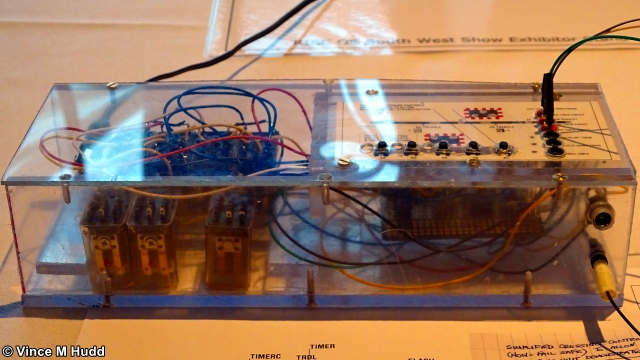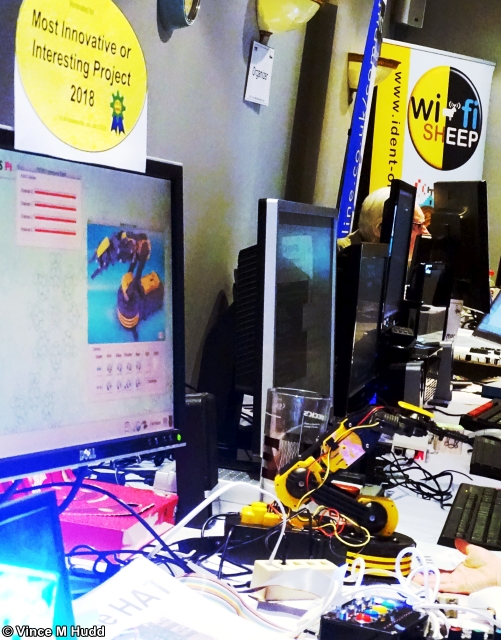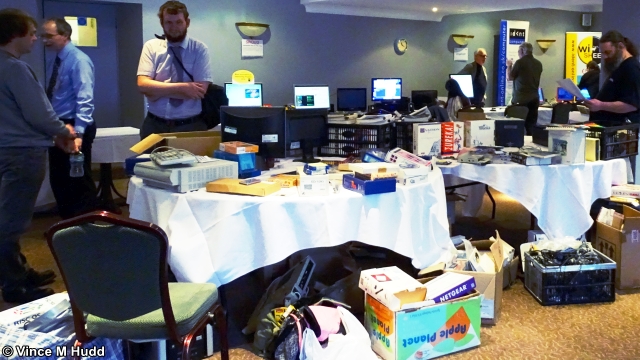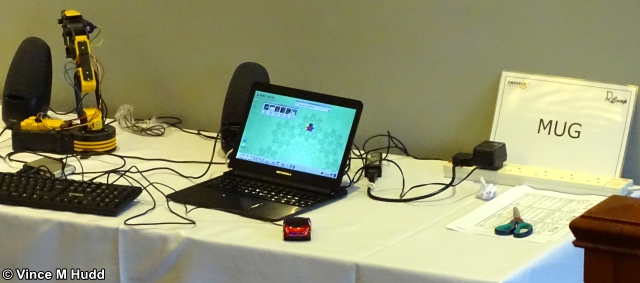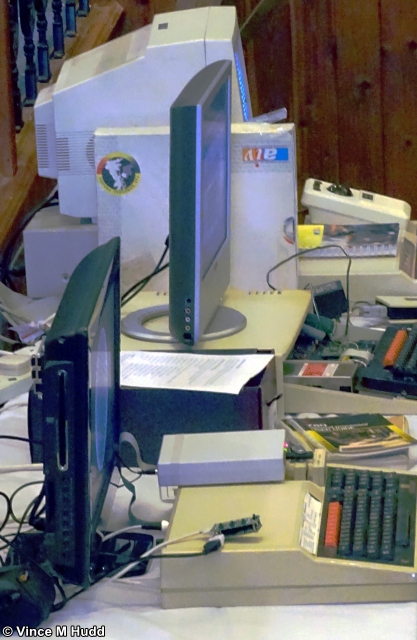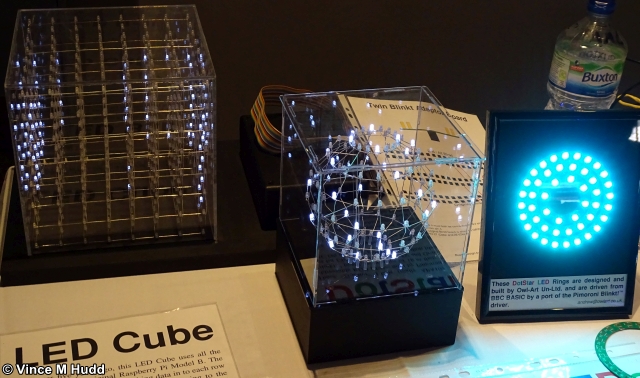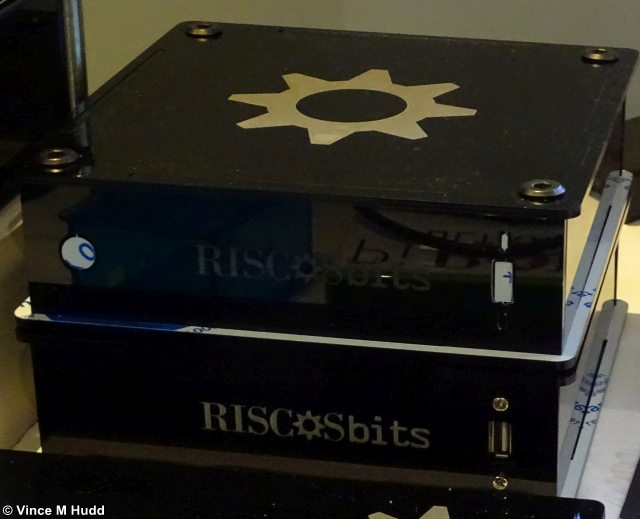It was the dawn of the third age of mankind second venue for the RISC OS Southwest Show
Since its inception, each and every Southwest Show until this year’s had been held at the Webbington Hotel in Somerset – a grand total of twenty one shows, with twenty years between the first, which took place on 7th February, 1998, and last year’s event, which took place on 24th February, 2018.
The Webbington is a very nice hotel, but it is let down by its location. It’s very close to the M5 motorway (you can see it as you whiz by between junctions 21 and 22), which sounds good until you discover that it’s actually quite a trek to reach it – not difficult by car, but a lot further by road than its visibility from the motorway might otherwise suggest, and very difficult for those travelling by public transport. This was becoming a notable problem with both visitors and some exhibitors alike raising it as an issue. An alternative venue was needed.
And one was found.
A short drive from the M32 motorway, and a short bus trip away from Temple Meads railway station, say hello to the Arnos Manor Hotel in Bristol, which saw the RISC OS show-going world descend upon it on 16th February, 2019.

The main show space in the new venue consisted of two rooms, with the majority of the exhibitors placed around the outside walls of both, and it also benefited from a separate room for use as a show theatre; a very welcome change for the usual arrangements at this event. This report will follow a clockwise path from the main entrance to the show and through the two rooms.

Orpheus Internet / RISC OS Developments
Richard Brown, one of the show’s organisers, had the first stand, where he served three roles; doorman, and representative of both Orpheus Internet and RISC OS Developments.
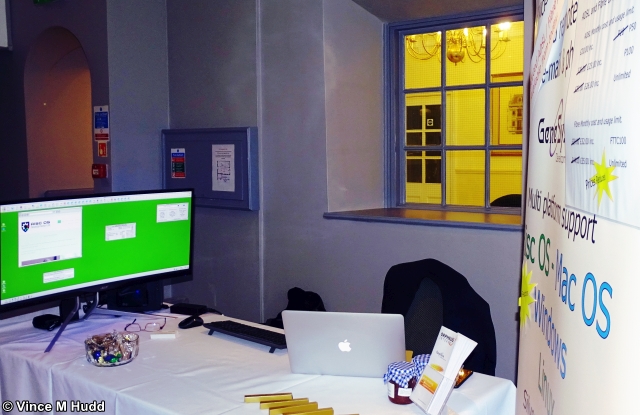
As the friendly face of the friendliest ISP to the platform, Orpheus Internet, Richard is able to provide RISC OS users (and even people using more obscure operating systems such as Windows, MacOS, and Linux) with internet connectivity, offering both ADSL and fibre options. The company also offers hosting services, and has a number of packages, depending on the your needs – so whether you want a simple website to show off images of your classic car, or a professional website to showcase and promote your products, Orpheus has you covered.
As well as Orpheus Internet, Richard was also representing RISC OS Developments, the company he set up with Andrew Rawnsley only a few short years ago, and was therefore answering questions about the new company, its goals – and its achievements so far. However, rather than report on that at this point, on this occasion it’s better left until later.
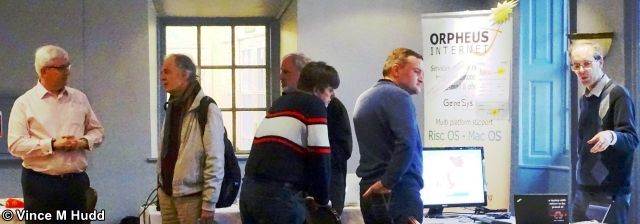
Sine Nomine
The second stand on this route around the show belonged to Sine Nomine – a source for a range of puzzle games, a powerful database application, and what has largely been their headline act for a while now, mapping application RiscOSM – and a new, related program, Recce.
Recce works alongside RiscOSM to pull down photographs from a number of online sources, allowing you to look around the location you’ve selected in the map app – with some of those sources only being accessible thanks to recent improvements to the RISC OS TCP/IP stack
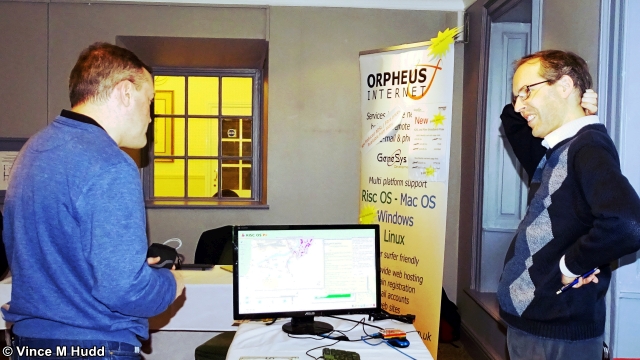
A demonstration of the new application formed a large part of Matthew Phillips’ show talk, including (at the end, an earlier attempt during the demonstration didn’t work) its ability to pull images from Google’s StreetView – probably the first time this has been possible from software running on RISC OS.
Matthew Phillips’ talk at Southwest 2019
RISC OS User Group of London (ROUGOL)
Bryan Hogan was next, trying to convince people to pay a visit to the nation’s capital on the third Monday of each month – which, by pure coincidence, happens to be when ROUGOL meets up, usually with an interesting guest speaker. As an example, the group’s next meeting was just two days after the Southwest Show, and Chris Cox, who many long-time RISC OS users will recognise as one of the public faces at Acorn, was lined up to talk.
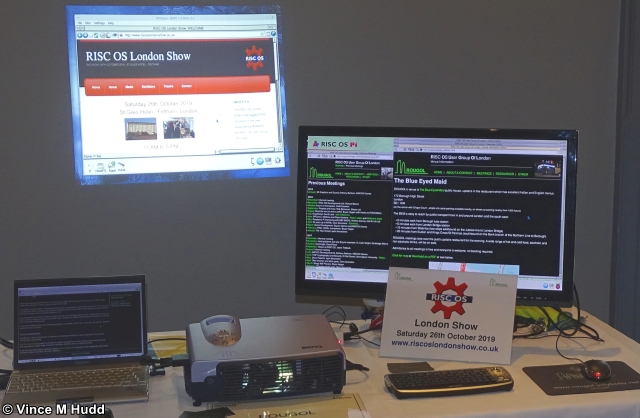
The group also organises the annual London Show, which takes place towards the end of October (usually the weekend on which the clocks change) – this year, that’s Saturday, 26th October.
Chris Hall
Local user Chris Hall was demonstrating a number of things on the next table, with both software available to buy on USB flash drive, and home-brewed hardware.
On the software front, he was selling FamTree, an application that can produce a family tree from data held in a tree-like database that comes built into every RISC OS computer and with which we are all familiar – the filing system! Launched at last year’s show, the application is pointed at a directory, and within the tree below it each subdirectory represents an individual or couple, with offspring represented by further subdirectories.
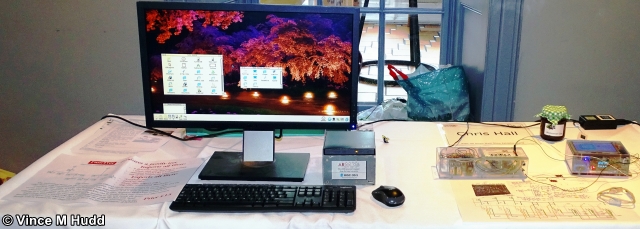
Chris’ latest hardware project is a Raspberry Pi-based data logging system. The device was specifically designed for use monitoring signalling circuits on the Severn Valley Railway, for which he volunteers, but it should be possible to adapt it for other purposes.
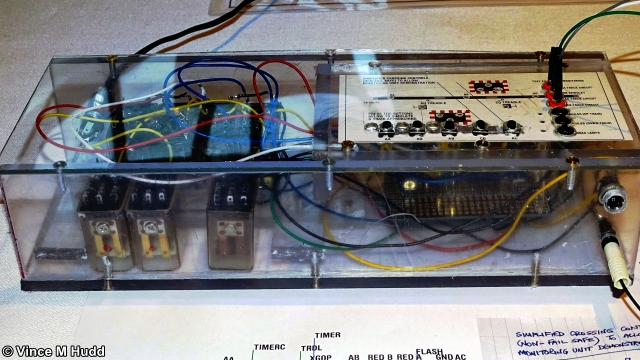
Sitting just to one side of the data logger was an older DIY project – the GPS unit. Also based around a Raspberry Pi, this device runs Chris’ own SatNav application that reads data from a GPS module and can log it, display it on e-ink and/or OLED displays, or if a suitable screen is attached feed it to Sine Nomine’s RiscOSM to display its location on a map.
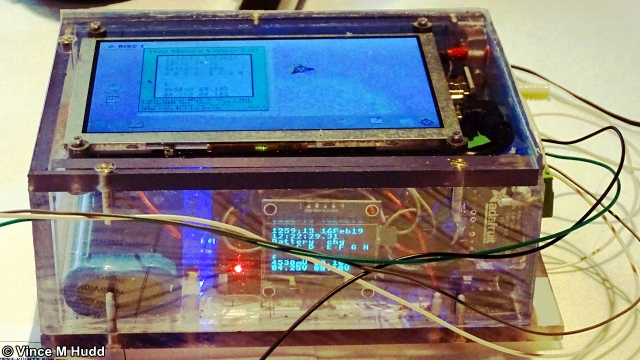
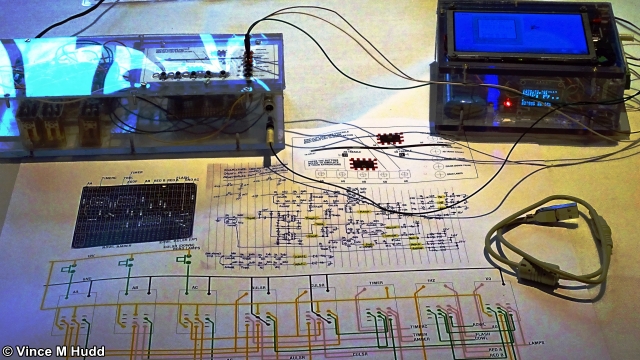
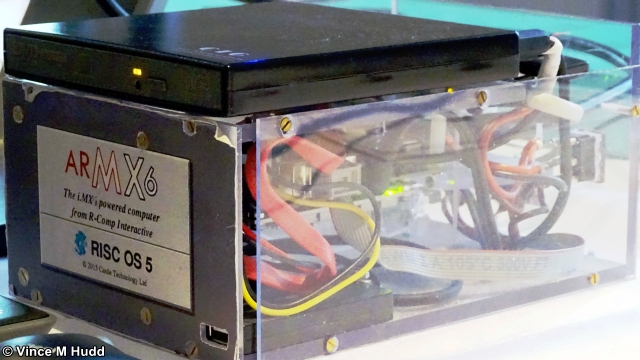
Ian Nicholls
Another local user is Ian Nicholls, who has built a clock around a Raspberry Pi Zero and a GPS module. With software written in BBC BASIC, the GPS module is interrogated for the time, which is then displayed on screen, and is accurate to within around 0.15 seconds…

However, there is slight a flaw inherent in a clock that relies on an external source for the time, which is the lack of a time to display if that source is unavailable – in this case, if the GPS module isn’t able to pick up the signal from any GPS satellites. Oops.
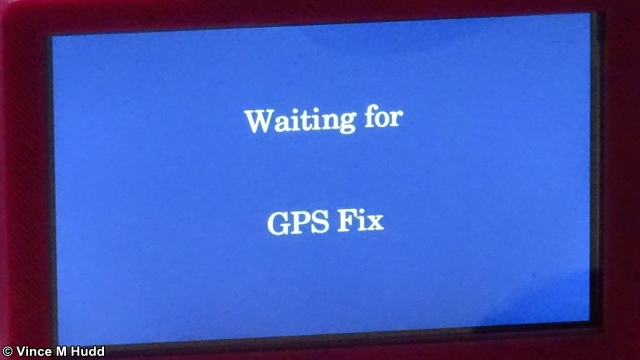
(Any suggestion that I deliberately chose to take photographs of the clock when I spotted the lack of a GPS fix are entirely, er… correct!)
RISC OS Open Ltd (ROOL)
While RISC OS Developments now owns the operating system, it remains RISC OS Open Ltd that is tasked with looking after it – and after missing the 2018 show, 2019 saw their return to the Southwest, with Steve Revill and Rob Sprowson representing the company on the day.
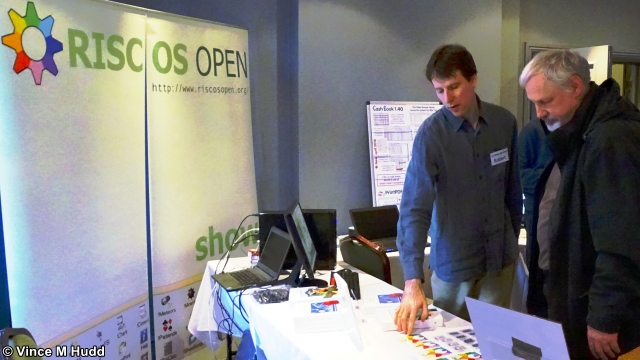
As usual, there were a number of things available to buy, including the latest versions of RISC OS on a micro-SD card for booting a Raspberry Pi, both as the basic disc image and in the form of ePic, which includes a good selection of commercial software bundled onto the card. There were also USB flash drives sporting a complete RPCEmu set up and ready to run on other platforms, the fairly recently updated BBC BASIC manual and RISC OS 5 User Guides, and the latest development tools.
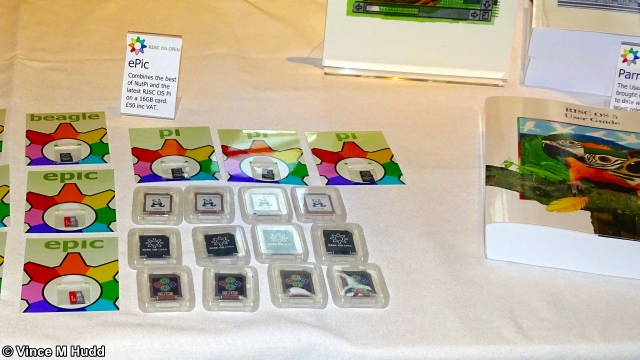
Steve and Rob were talking visitors through everything that’s been going on with the company, developments in the OS, what open sourcing it means, and so on, but Steve also talked about all of this to a wider audience when he gave a talk:
Steve Revill’s talk at Southwest 2019
Steve Fryatt
Although all of his software is available to download for free from his website, whenever Steve Fryatt exhibits at shows he also gives people the opportunity to buy it on CD for a mere fiver – with the money raised going to a good cause. It’s an extensive collection, including simple desktop games, software for producing PDF files, desktop utilities, a full-blown home accounts package, and much more, so it represents excellent value for money, with that added fuzzy warm feeling of knowing you’ve contributed to a good cause.
Steve had the next stand, and also took a slot to talk about and demonstrate some of it to an audience:
Steve Fryatt’s talk at Southwest 2019
Cameron Cawley
Moving through the door into the second room, the first exhibitor here was Cameron Cawley, a name people in the RISC OS world may not be terribly familiar with. Cameron was telling people about some of what he has done – which amongst other things includes porting version 2.0 of ScummVM to the platform, and with it a number of games playable via the system.
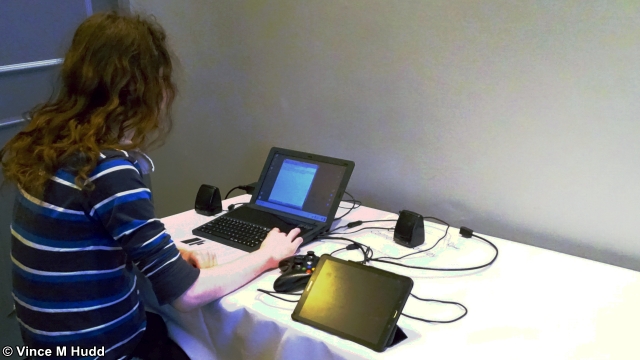
Midlands User Group
Another RISC OS user group came down from the Midlands, with the aim of enticing those RISC OS users who also came from that direction to occasionally head their way. Meeting every other month, the group often features an interesting talk and/or discussion on a RISC OS topic.
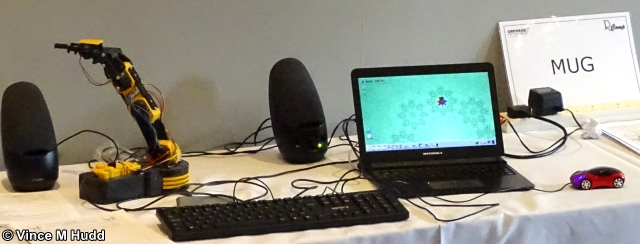
Soft Rock Software
For show visitors interested in RiscPC-inspired cases for the Raspberry Pi, or getting their hands on a selection of budget games and other software, a little climb was necessary to reach me on the Soft Rock Software stand. I chose to position myself by the entrance to the room used for the various talks (so I could easily nip in and out to start and stop the camera) – but the flip side was that to get to me, it was necessary to venture slightly afield of the rest of the exhibitors.
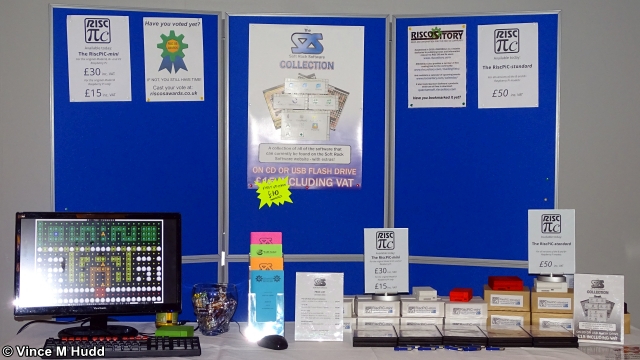
This time, along with the USB flash drives and CD software collections, free sweets, and RiscPiC-mini cases, there was something new available: After many mistakes (at notable cost) I had finally got the design of the RiscPiC-standard case right (as seen at London 2018), and for this show had the first small batch available.
Steve Drain
Although he wasn’t exhibiting, I did manage to catch up with Steve Drain while he sat down for a break on the same mountainous level as me. Steve had one of his Raspberry Pip machines with him – a modified Raspberry Pi in a small case, attached to an Atrix Lapdock keyboard and screen.
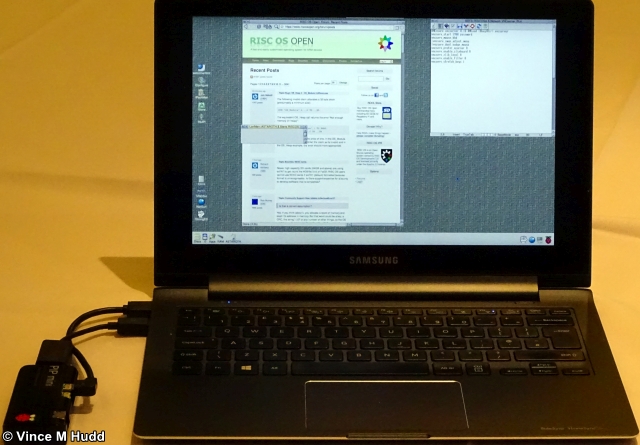
3rd Event
After descending from the heady heights to ground level once again, the next exhibitor was 3rd Event Technologies, making a Southwest Show debut. Regulars at the London Show, 3rd Event don’t usually attend this one because it’s less practical to get to, even though it’s their local show – but the move to a Bristol venue has changed that.
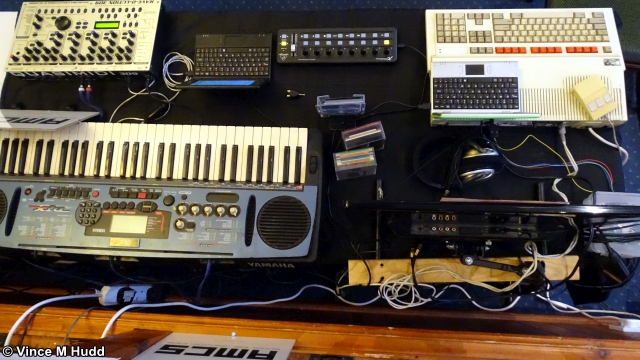
3rd Event were showing off AMCS – the Advanced Music Construction System. AMCS isn’t so much for RISC OS as it is a replacement for it; though not in the sense of it being an OS for general use – as its name suggests, the software is used to ‘construct’ music, but rather than rely on RISC OS to provide access to the underlying hardware, it instead includes its own OS and is able to talk directly to the hardware.
And since it doesn’t use RISC OS, but includes its own OS layer, that means it can be ported to other hardware platforms – and 3rd Event have done exactly that, with a version that runs on certain ARM-based netbooks.
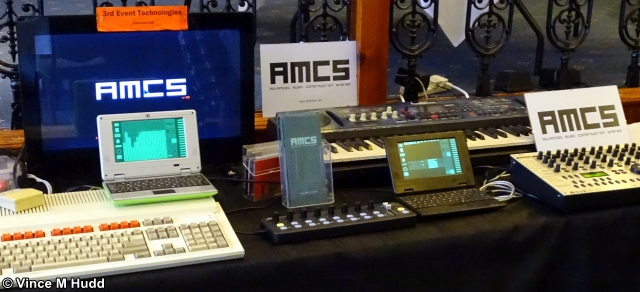
Acorn and BBC User Group (ABUG)
A user group of a different sort, ABUG doesn’t have a home base or area as such, and instead its members get together in a variety of locations up and down the country for meetings that are better described as ‘jamming’ sessions. The members use those sessions to continue developing whatever projects they are currently working on, but collaboratively, helping one another out, discussing ideas, and so on. (Similarly, they don’t have their own website, and the various members can be found hanging around on Stardot, which is where all arrangements are made).
For the Southwest Show, the group had brought along something out of a James Bond movie to show off to visitors.
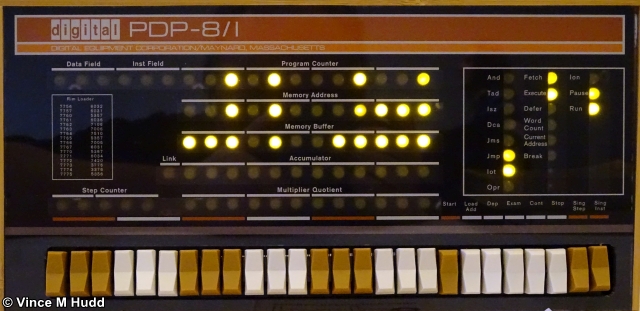
It must have taken some effort to get that into the venue, but I was surprised at the lack of henchmen milling around in front of it. Every good Bond villain has them, and if the villain has a massive computer system, milling around in front of it is where those henchmen should be!
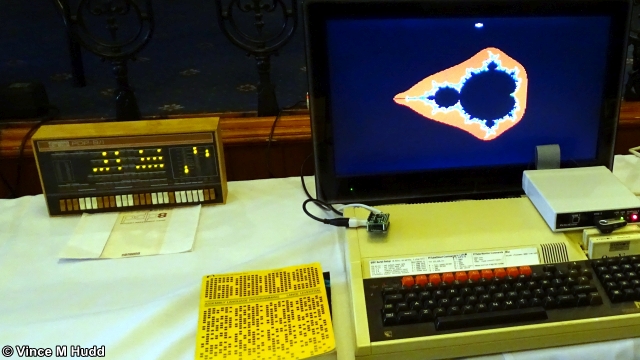
Ah, okay – the PDP-8/1 being displayed by ABUG at Southwest 2019 isn’t actually that big after all. I may have been exaggerating above, just a little bit!
Rob Coleman
The ABUG display had actually been brought along by Rob Coleman – but as well as ABUG, he was also exhibiting as himself, because he has a rather clever product to show off.
The BBC Microcomputer has a very limited colour palette, offering a total of sixteen entries, with eight solid colours and eight flashing combinations. Rob has created a neat add-on called VideoNuLA, which provides the 8-bit computer with a much greater palette of 4,096 colours, along with other benefits such as smoother scrolling (the BBC’s built-in hardware scrolling was limited to a byte at a time, so how smooth the scrolling was depended on the screen mode in use – the fewer bits per pixel, the more jerky the scroll).
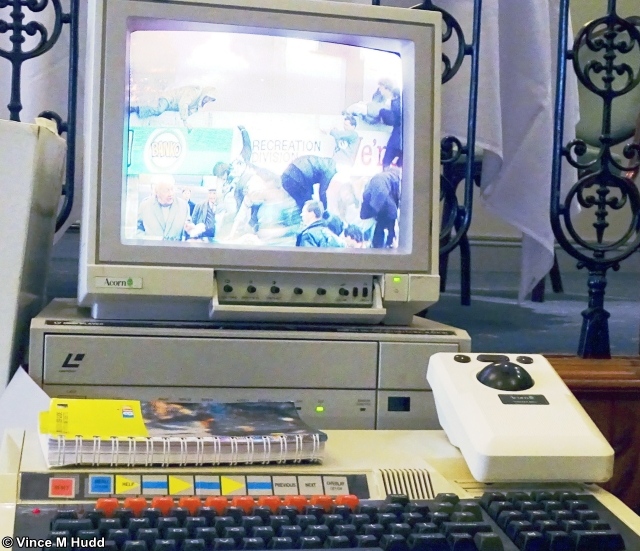
Rob was also running an Amstrad CPC 464 emulator on his BBC Micro, although (and don’t tell him I told you this, because it might be a secret) there was a small amount of cheating going on, because some of the emulator’s work was being carried out on a Raspberry Pi that was also installed in his computer as a co-processor.
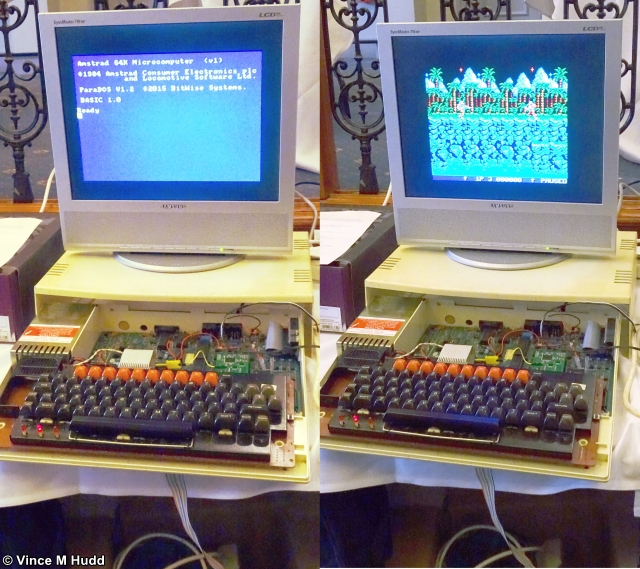
Rob had also brought along a robot turtle, which saw a little use during the day.
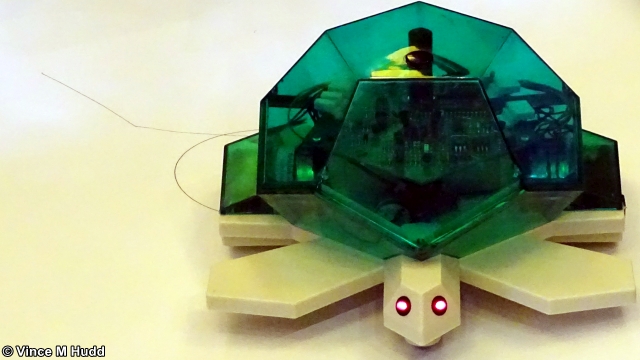
John Norris’ bell ringing
If you have an interest in campanology, you needed look no further than John Norris and his papier-mâché bell – a bell that itself makes no sound. Instead, a sensor on the wooden frame is used to feed a signal to the attached computer, and the computer then plays the necessary bell sound.
Cunningly – if I’ve got this right – the computer is playing the overall bell sequence without the individual bell the user is supposed to be ringing – so when the user rings that bell, its sound is inserted, allowing the user to practice as though part of a bell-ringing group.
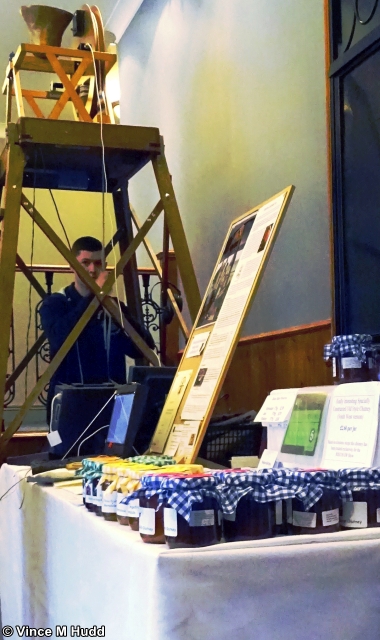
Tasty Treats
I wish the layout of exhibitors had been slightly different, and John’s wife Mary had been placed immediately after ABUG – because then I could have segued from jamming sessions to actual jam. But it wasn’t, so I can’t. Oh well.
Although thinking about it, segue is a musical term, and there were bells in-between them, so perhaps it worked after all?
Ahem. Anyway…
After John, Mary was present with her selection of Tasty Treats, a range of home-made jams and chutneys, a lot of which began selling before the show had even opened – and I might be mistaken, but I think I saw a member of the hotel staff purchasing a quite sizeable batch as well! I wonder if that was for personal or hotel use?
R-Comp
The show’s other organiser is Andrew Rawnsley of R-Comp fame, and his company was the next one a visitor would encounter upon re-entering the main room. However, before talking about R-Comp’s stand, this would be a good point to discuss RISC OS Developments, which I briefly mentioned much nearer the start.
The company was formed by Andrew and Richard Brown of Orpheus Internet only a few very short years ago, with the aim of raising money for a project that, at the time, was largely kept under wraps. That project was revealed at the show to be a more up to date and capable web browser for the platform, something that is sorely missing. (NetSurf, of course, is an excellent browser that performs splendidly on modern RISC OS kit, but it is a long way off providing users with a browsing experience that matches the one experienced by users of other platforms).
The project is a very difficult one to complete – with a number of avenues open to the company in terms of different open source browsers to try to port to RISC OS, but subject to being able to find someone capable of doing the work. There have been a number of false starts in that area, but progress is now being made thanks to Michael Grunditz, who flew in to the UK from Sweden to put in an appearance at the show.
Although not part of that original project, in a surprise move last year RISC OS Developments managed to acquire Castle Technology, and with it RISC OS itself, which it has now re-licensed under the Apache open source licence. And one of the benefits of that change of licence brings us back, very neatly, to R-Comp.
Just before the London Show, Andrew started dropping hints about a RISC OS laptop – with the OS running natively on ARM-based hardware, rather than an emulator running on Windows – and at the show itself this was revealed to be a Pinebook. It emerged that the makers of the laptop had approached R-Comp with a view to porting RISC OS to run on it; while it was nice to have a choice of Linux builds, a completely different OS would be nicer still – and with RISC OS now under the Apache licence, it was an obvious choice.
The port wasn’t yet complete at the Southwest Show, but progress is being made (and with this report being somewhat behind – again – things are now further along, and some of R-Comp’s customers now have Pinebooks, aka ARMBo(o)ks, in their hands.)
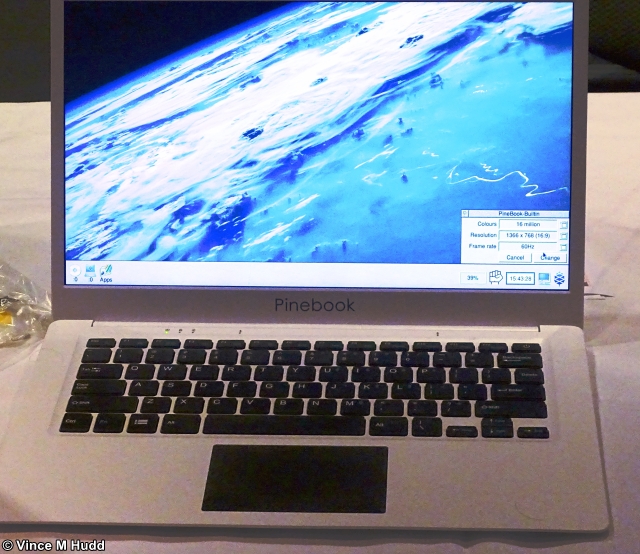
Other hardware on the R-Comp stand included the Titanium-based Titan and TiMachine computers, along with the Wandboard-based ARMSX ARMX6 and its younger (and much smaller) sibling, the mini.m – and the company’s range of emulation solutions; Windows hardware with VirtualRiscPC pre-installed, such as the RISCbook Go! A small, light notebook.
Software also forms a large part of R-Comp’s catalogue, and there were new versions of a number of packages at the show. Amongst other things, the latest Fireworkz Pro features a ‘statement’ mode to make reading lines of figures easier by shading alternate rows, and sees its database facility enhanced for better integration with other components. A new version of NetFetch was released – albeit only as a beta download because time in the run up to the show was limited – and benefits from SSL/TLS support with the new AcornSSL module. And there was also a new version of the ARMX6 graphics acceleration tool, adding support for legacy, full-screen modes.
Andrew gave one of the day’s talks, in which he covered both the RISC OS Developments, er.. developments, and some of the R-Comp products.
Andrew Rawnsley’s talk at Southwest 2019
Andrew Conroy and the Southampton RISC OS User Group (SROUG)
Once again, the show’s exhibitors didn’t include CJE Micro’s – but that meant employee Andrew Conroy had another opportunity to come along in his own right, to show off his own projects and to represent SROUG – the Southampton RISC OS User Group – which meets for a couple of hours one evening each month to allow local users to show off their personal projects, discuss OS matters, and so on.
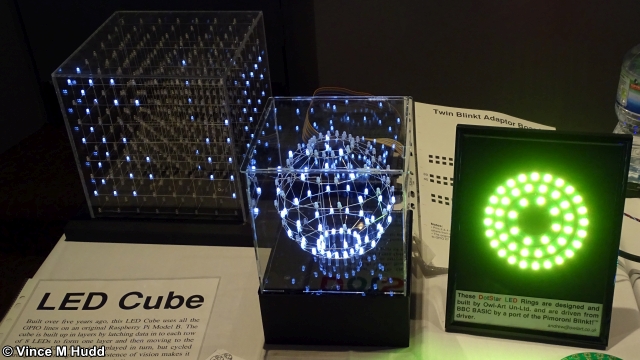
Andrew’s own projects seem to involve Raspberry Pis and flashing lights – lots and lots (and lots and lots) of flashing lights, and it’s easy to imagine that if Andrew bothers putting up a Christmas tree in December, the tree lights would effectively be hidden in plain sight, barely noticeable amongst all the other flashing lights.
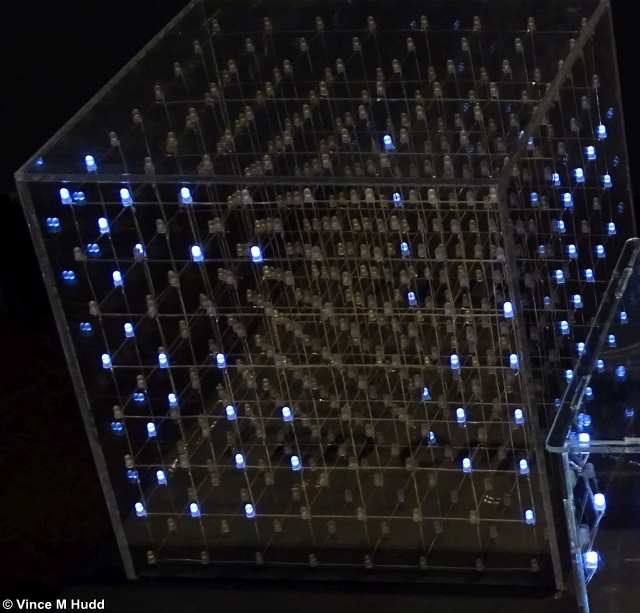
AMCOG Games
The next stand was home AMCOG Games, manned by Tony Bartram. I routinely refer to Tony as a newcomer to the RISC OS World, but Tony’s first release for the platform, Overlord, was in 2015, which saw its official launch at that year’s Wakefield Show, almost four years previously. There must surely come a time when he can no longer be considered new…
Nah, he’s still officially new to the platform. Maybe from 2020 I’ll adjust that to say he’s relatively new.
Anyway, that musing aside, Tony had once again brought along his ever-growing selection of games for the platform, which visitors could buy either on CD or USB flash drive, if they haven’t done so already via !Store. The latest of these games, Stunt Racers, was released in time for London 2018, and is a top-down racing game, in which the player competes against computer-controlled cars to win a race around an obstacle-laden track.
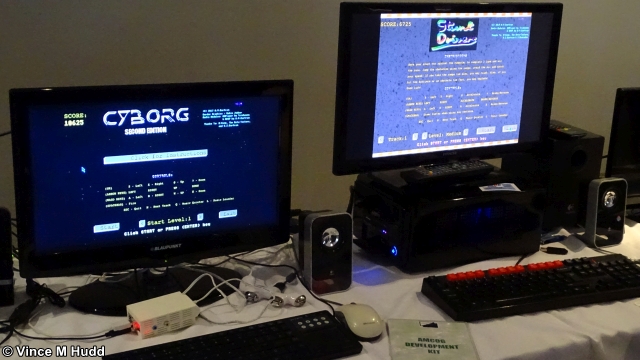
The next title again was already in the very early stages of development at the time of this show, though, and Tony was showing visitors what he expected it to look like in the form of concept art for the game, to be called Escape from the Arcade.
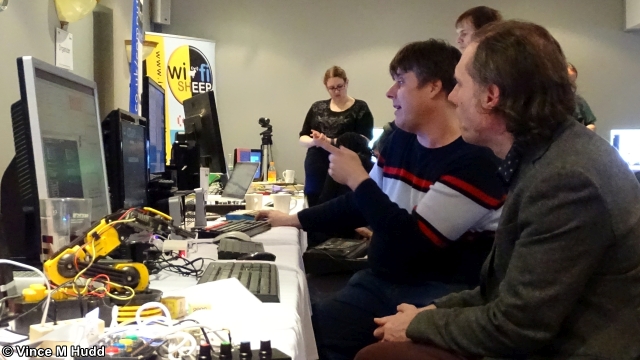
North One Communications / Organizer
Rat- Organizer-on-a-Stick was available from the next stand, where Cut-me-own-throat Dibbler Nigel Wilmott was demonstrating and selling the – no THE – personal organiser for RISC OS.
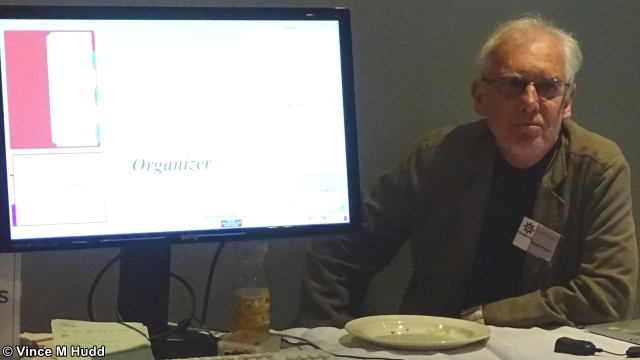
Organizer is a very comprehensive diary, contact database, and personal organiser designed for RISC OS users as a replacement for the much simpler, standard application Alarm, and offers everything Alarm does and much, much more, and in recent releases has gained features such as the ability to fire postcodes in the direction of RiscOSM so their location can be seen on the map, and to encrypt your data so that it’s safe from prying eyes.
The on-a-stick variety includes the software pre-installed in a RPCEmu-based emulation of a RISC OS computer, all supplied ready to run on a USB flash drive.
Ident/Wi-Fi Sheep
Tom Williamson’s company, which brought us the Micro One and the RiscCE systems based around the Raspberry Pi, were exhibiting again, only this time Ident Computer were promoting their YouTube tech news, opinion, and reviews channel, Wi-Fi Sheep.
The channel began life as a podcast and radio show, but has since extended its remit to include videos, and covers a range of technology-related topics from retro computing, to more modern kit, and more besides.
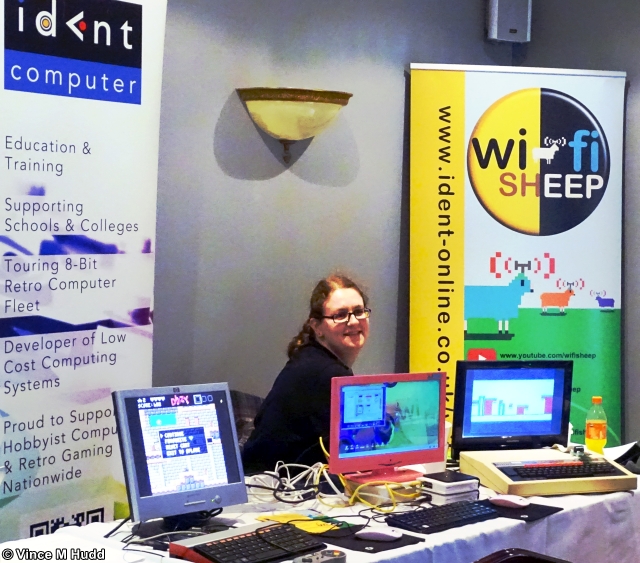
If you were alert during the show, you may have seen Tom wandering around with a video camera – and if so, you won’t be surprised to learn there is a video featuring highlights of the show on the Wi-Fi Sheep YouTube channel:
Highlights from the RISC OS Southwest Show 2019, courtesy of Wi-Fi Sheep
RISCOSbits
Purveyor of cases for most of the boards that are available and on which RISC OS can be run, as well as a number of fully configured machines all ready to go, Andy Marks was showing off the wide range of products from RISCOSbits.
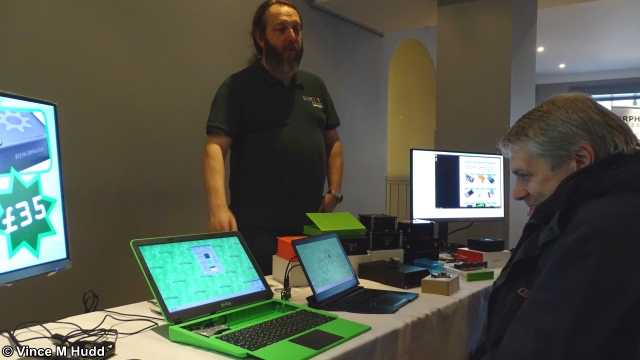
That range extends from simple skins that can be applied to standard Raspberry Pi cases or an acrylic slice with a RISC OS cog emblazoned on it for the pi-TopRO, docks for R-Comp’s mini.m, and much more besides. The complete systems available from the company are based around everything from the Raspberry Pi Zero to the Wandboard, and emulation solutions are also provided via the RiscPOD range – an enclosed mSATA hard drive, containing everything you need to get up and running via another platform.
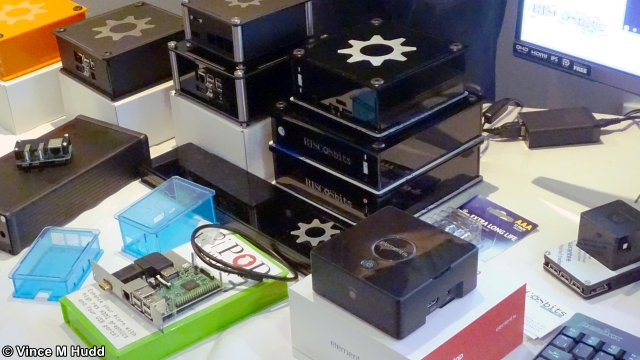
In addition to the main products, Andy also brought along some refurbished portable kit to sell, including a Lapdock.
Following the route I’ve outlined, RISCOSbits was the final exhibitor before the exit, but doing so misses out one other stand. As I said near the top of this report, the majority of exhibitors were positioned around the walls of the two rooms – but the majority isn’t all, and the one remaining stand was found in the middle of the main room. So last, but definitely not least…
The charity stand
Replete with all manner of goodies, from books and magazines, through software, to hardware accessories and even full-blown computers, the charity stand occupied that central area. This year the money raised – some £280 – found its way to Pets As Therapy, a national charity that provides animal-assisted therapy, by organising volunteer teams to take carefully assessed pets to residential homes, hospices, hospitals, and so on, so that residents and patients can have the joy of interacting with the animals.
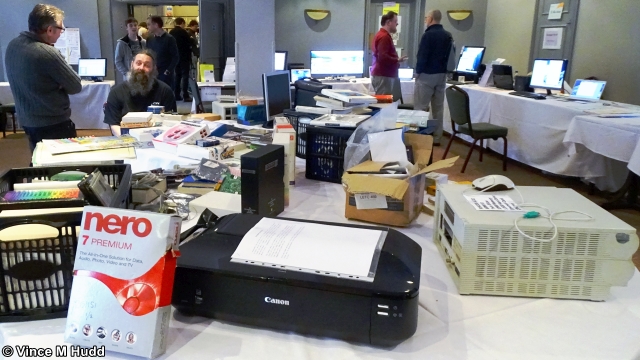
In a slightly bizarre twist, a small amount of that money came from me buying some software from the charity stand. Now, that might not seem particularly strange at all, given that the reason the software was being sold was so that someone could buy it, and the money paid put into the pot to go to the charity… until you realise exactly what the software in question was:
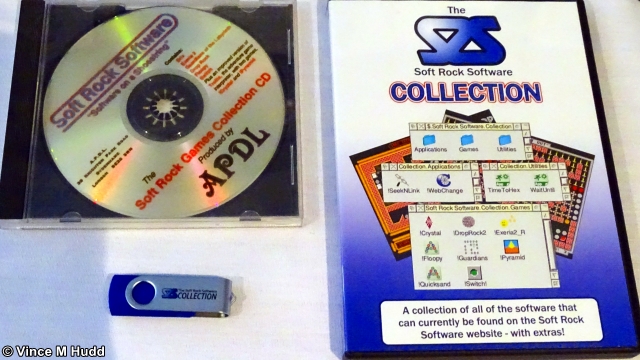
That’s right – I bought a collection of my own software from the charity stand, as put together and sold through APDL. Well, someone had to, right?
So that was the Southwest Show, 2019 – which the organisers have said was a resounding success. The date for the next Southwest Show has been announced as Saturday, 22nd February, 2020, and it will again be in the easy to find Arnos Manor Hotel in Bristol. If you can’t wait that long for a RISC OS show, though, it’s now just two months until the London Show takes place on Saturday, 26th October, at the St Giles Hotel, in Feltham.
Before that, there’s also the Acorn World event on the 21st and 22nd September, held at the Centre for Computing History in Cambridge – and there’s always the option of attending your nearest user group meeting!
Meanwhile, here are a few more photographs taken on the day:
